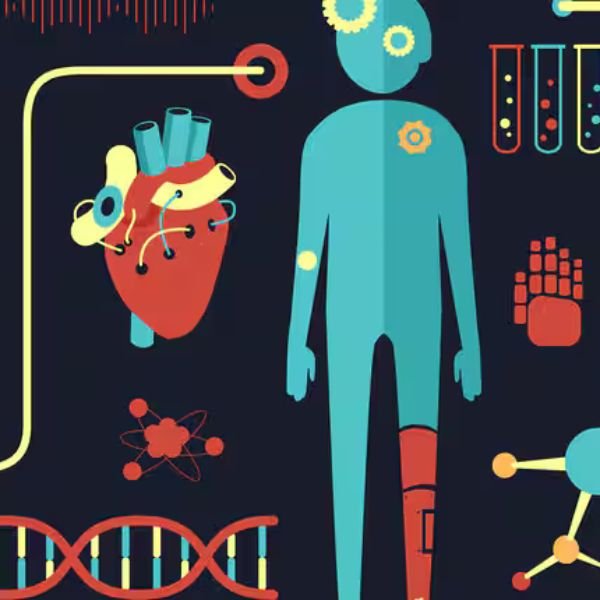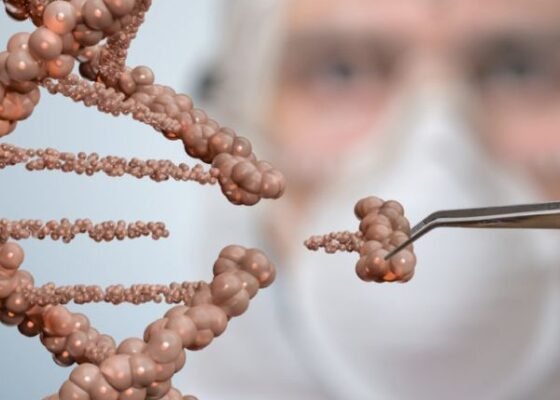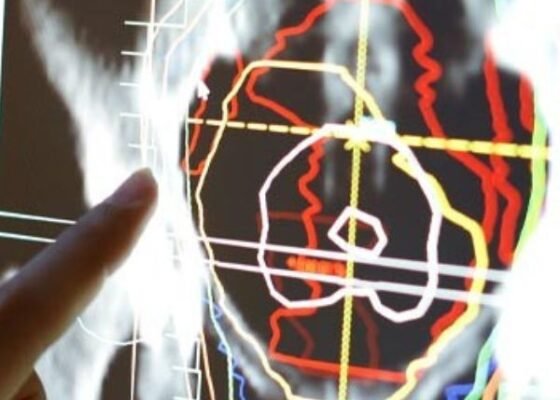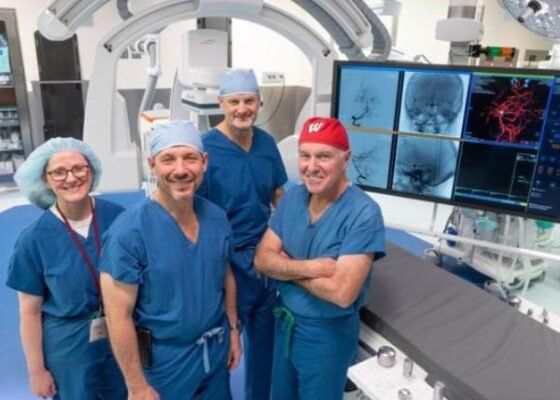Medical Bionano Technology colleges in Bangalore
Table of Contents
ToggleWhat is Medical Bionano technology?
Medical bio nanotechnology is an emerging interdisciplinary field that combines the principles of biology, nanotechnology, and medicine to create innovative solutions for healthcare.
This ground-breaking technology leverages the properties of Nano scale materials and biological systems to develop advanced therapeutic, diagnostic, and preventive strategies.
In this article, we will explore the fundamentals of medical bionanotechnology, its applications, and the promising future it holds for revolutionizing healthcare.
Fundamentals of Medical Bionanotechnology
At its core, medical bio nanotechnology involves the manipulation and control of materials and biological systems at the Nanoscale, which is typically between 1 and 100 nanometres (1 nm = 10^-9 meters). This scale enables researchers to observe and manipulate biological structures like proteins, DNA, and viruses that are otherwise inaccessible at the macroscopic level. By integrating Nanoscale components with biological systems, medical bionanotechnology aims to improve the understanding of cellular and molecular processes and design more effective treatments and diagnostic tools.
Applications of Medical Bionanotechnology
Medical bionanotechnology has far-reaching applications in healthcare, with potential impacts on diagnostics, therapeutics, and regenerative medicine. Some of the key areas where this technology is making a difference include:
- Targeted drug delivery: Nanoparticles can be engineered to carry drugs directly to specific cells, tissues, or organs, improving the efficiency of drug delivery and minimizing side effects. For example, researchers are developing nanoparticles that can selectively target cancer cells, reducing damage to healthy tissues during chemotherapy.
- Biosensors and diagnostics: Bionanotechnology allows for the creation of highly sensitive and selective biosensors, enabling rapid and accurate detection of diseases. These sensors can detect biomarkers, such as proteins or DNA, at extremely low concentrations, leading to earlier diagnosis and improved patient outcomes.
- Tissue engineering and regenerative medicine: Medical bionanotechnology has the potential to revolutionize tissue engineering by providing nanoscale scaffolds and matrices that promote cell growth and tissue repair. This can lead to the development of artificial organs and tissues, reducing the need for organ transplants and improving the quality of life for patients with organ failure.
- Gene therapy: The use of nanoparticles as gene carriers allows for the targeted delivery of genetic material to specific cells or tissues, potentially correcting genetic disorders and diseases.
The Future of Medical Bionanotechnology
As research in medical bionanotechnology continues to advance, we can expect the emergence of new therapies, diagnostics, and preventive measures that will revolutionize healthcare. This technology offers the potential to tackle complex diseases, such as cancer and neurodegenerative disorders, which have been difficult to treat using conventional methods.
However, as with any emerging technology, medical bionanotechnology also faces several challenges. These include ethical considerations, regulatory issues, and the potential for unforeseen side effects or risks. To ensure the safe and responsible development of this promising field, researchers, policymakers, and industry leaders must work together to address these concerns and create a framework for the successful integration of medical bionanotechnology into healthcare.
Top Medical Bionano Technology Colleges in Bangalore
The field of medical bionanotechnology is gaining immense popularity as it integrates the principles of biology, nanotechnology, and medicine to address challenges in healthcare. As a result, aspiring students are increasingly seeking top-notch educational institutions to equip themselves with the necessary knowledge and skills in this interdisciplinary domain. In this article, we highlight the top medical bionanotechnology colleges in Bangalore, India’s burgeoning hub for biotechnology and information technology.
Indian Institute of Science (IISc)
The Indian Institute of Science (IISc) is a renowned research institution that offers exceptional programs in various interdisciplinary areas, including medical bionanotechnology. With state-of-the-art facilities, experienced faculty members, and a strong research focus, IISc is the perfect destination for students seeking cutting-edge knowledge in this field. Students can pursue postgraduate and doctoral programs in departments such as the Centre for Nano Science and Engineering (CeNSE) and the Department of Molecular Reproduction, Development, and Genetics (MRDG), which offer courses and research opportunities in medical bionanotechnology.
National Institute of Advanced Studies (NIAS)
Located within the campus of the Indian Institute of Science, the National Institute of Advanced Studies (NIAS) is a multidisciplinary research institute that promotes interdisciplinary research and education. NIAS offers research programs in areas related to medical bionanotechnology, including nanomaterials, bioengineering, and advanced biomedical technologies. Students at NIAS have access to world-class facilities and collaborate with top scientists to develop innovative solutions in the medical bionanotechnology sphere.
PES University
PES University is a premier institution in Bangalore known for its high-quality education and research opportunities. The university offers courses in biotechnology, bioengineering, and nanotechnology, providing students with a solid foundation in medical bionanotechnology. PES University’s Department of Biotechnology focuses on various aspects of bionanotechnology, including drug delivery systems, tissue engineering, and molecular diagnostics. Students can also engage in cutting-edge research projects to enhance their understanding of the subject and its practical applications.
BMS College of Engineering (BMSCE)
BMS College of Engineering is a leading institution in Bangalore that offers undergraduate and postgraduate courses in biotechnology and nanotechnology. The college’s Department of Biotechnology fosters a strong research culture, covering areas like bionanotechnology, drug delivery, and biosensors. BMSCE’s collaboration with reputed research organizations and industries enables students to gain practical experience, preparing them for a successful career in medical bionanotechnology.
M.S. Ramaiah Institute of Technology (MSRIT)
M.S. Ramaiah Institute of Technology is an esteemed institution that offers undergraduate and postgraduate programs in biotechnology, bioengineering, and nanotechnology. The Department of Biotechnology at MSRIT emphasizes research in medical bionanotechnology, including targeted drug delivery, nanomaterials for tissue engineering, and biosensors. The institute’s modern facilities and well-qualified faculty members provide students with an excellent learning environment to explore the fascinating world of medical bionanotechnology.
What students study in Medical Bionano technology in Bangalore?
Medical bionanotechnology is an interdisciplinary field that merges biology, nanotechnology, and medicine to develop innovative solutions for healthcare challenges. As this rapidly evolving domain gains prominence, more students are pursuing educational opportunities in medical bionanotechnology. In this article, we delve into the diverse subjects and topics students study in medical bio-nanotechnology programs to equip themselves with the necessary skills and knowledge to shape the future of healthcare.
Fundamentals of Biology and Nanotechnology
The foundation of medical bionanotechnology lies in understanding the principles of both biology and nanotechnology. Students study core concepts in molecular and cellular biology, genetics, and biochemistry to gain a comprehensive understanding of biological systems. They also explore the fundamentals of nanotechnology, including Nanoscale materials, nanofabrication techniques, and the unique properties of nanoparticles. These foundational subjects provide students with the essential background knowledge to delve deeper into medical bionanotechnology.
Biomedical Applications of Nanotechnology
One of the key aspects of medical bionanotechnology is the development of novel biomedical applications using nanoscale materials and systems. Students learn about the various applications of nanotechnology in healthcare, including drug delivery, diagnostics, tissue engineering, and regenerative medicine. They explore how nanoparticles can be designed and engineered for targeted drug delivery, the development of biosensors for early disease detection, and the creation of nanoscale scaffolds for tissue regeneration.
Nanobiotechnology Techniques
To work effectively in the field of medical bionanotechnology, students must master a range of techniques used to manipulate and analyze nanoscale materials and biological systems. These techniques include atomic force microscopy, scanning electron microscopy, and transmission electron microscopy, which enable the visualization and characterization of nanoscale structures. Students also learn about various fabrication techniques, such as self-assembly, lithography, and chemical synthesis, to create nanoscale materials with desired properties.
Bionanomaterials and Nanotoxicology
The study of bionanomaterials focuses on understanding the interactions between nanoscale materials and biological systems. Students learn about the different types of nanomaterials used in medical bionanotechnology, including organic, inorganic, and hybrid materials. They also explore the potential risks and toxicological aspects associated with the use of nanomaterials in biological systems, ensuring the safe and responsible development of medical bionanotechnology applications.
Ethical, Legal, and Regulatory Considerations
As an emerging field, medical bionanotechnology faces numerous ethical, legal, and regulatory challenges. Students study the ethical implications of using nanotechnology in healthcare, including the potential impact on patient privacy, informed consent, and social equity. They also learn about the legal and regulatory frameworks governing the development, approval, and commercialization of medical bionanotechnology products, ensuring compliance with national and international standards.
Research and Innovation in Medical Bionanotechnology
Students pursuing a degree in medical bionanotechnology are often encouraged to engage in research projects and collaborate with faculty members to develop innovative solutions for healthcare challenges. These research experiences provide students with hands-on exposure to real-world problems and foster critical thinking, problem-solving, and communication skills essential for a successful career in this interdisciplinary field.
Scope after Studying Medical Bionanotechnology in Bangalore
Medical bionanotechnology, an exciting interdisciplinary field that combines biology, nanotechnology, and medicine, is making significant strides in revolutionizing healthcare. With the increasing demand for skilled professionals in this domain, students pursuing medical bionanotechnology can look forward to a plethora of opportunities post-graduation. In this article, we explore the diverse career prospects and potential industries for graduates in medical bionanotechnology.
Pharmaceutical and Biotechnology Industries
Graduates with a background in medical bionanotechnology can find rewarding career opportunities in pharmaceutical and biotechnology companies. These industries are continuously seeking innovative solutions to enhance drug delivery, diagnostics, and therapeutic interventions. Professionals in this field can contribute to research and development, formulation and process development, quality control, and regulatory affairs. Additionally, they can work on cutting-edge projects involving targeted drug delivery systems, nanomedicines, and diagnostic tools.
Academic and Research Institutions
With the growing interest in medical bionanotechnology, many academic and research institutions are actively expanding their research programs in this domain. Graduates can pursue careers as researchers, scientists, or faculty members, working on projects that advance our understanding of biological systems and develop novel nanoscale technologies. These positions often involve collaboration with interdisciplinary teams, grant writing, and publishing research findings in scientific journals.
Medical Device Industry
The medical device industry is another promising sector for medical bionanotechnology graduates. Nanotechnology is increasingly being used to develop advanced medical devices, such as biosensors, implants, and drug delivery systems. Professionals in this industry can contribute to the design, development, and testing of innovative medical devices, ensuring their safety, efficacy, and compliance with regulatory standards.
Tissue Engineering and Regenerative Medicine
Graduates in medical bionanotechnology can explore career opportunities in the rapidly evolving field of tissue engineering and regenerative medicine. They can work on projects involving the development of nanoscale scaffolds, biomaterials, and stem cell technologies to promote tissue regeneration and repair. These professionals can contribute to the advancement of novel therapies for a variety of medical conditions, including organ failure, spinal cord injuries, and degenerative diseases.
Start-ups and Entrepreneurship
The growing interest in medical bionanotechnology has led to an influx of start-ups focusing on the development of innovative solutions in healthcare. Graduates with a passion for entrepreneurship can establish their own ventures or join existing start-ups, working on cutting-edge projects with the potential to revolutionize healthcare. These opportunities allow professionals to contribute their expertise and creativity to bring novel products and technologies to market.
Consultancy and Intellectual Property Management
Graduates in medical bionanotechnology can also pursue careers in consultancy and intellectual property (IP) management. As experts in the field, they can provide valuable advice to companies and research institutions on the development and commercialization of medical bionanotechnology products. They can also work in IP management, assisting organizations in securing patents and protecting their innovations.
Placement opportunities after Studying Medical Bionanotechnology in Bangalore
Medical bionanotechnology is an emerging field that fuses biology, nanotechnology, and medicine to develop innovative healthcare solutions. As the demand for skilled professionals in this interdisciplinary domain grows, graduates can expect a wide array of placement opportunities across various industries. This article discusses the top placement opportunities for medical bionanotechnology graduates, highlighting the diverse sectors where their expertise is highly sought after.
Pharmaceutical and Biotechnology Companies
Pharmaceutical and biotechnology companies are at the forefront of medical bionanotechnology, offering numerous placement opportunities for graduates. They can work in research and development, focusing on the design and synthesis of nanoscale drug delivery systems, diagnostic tools, and therapeutic agents. Other roles within these companies include quality control, process engineering, and regulatory affairs, ensuring the safety and efficacy of medical bionanotechnology products.
Top pharmaceutical and biotechnology companies that actively recruit medical bionanotechnology graduates include Pfizer, Novartis, Johnson & Johnson, Roche, Merck, GSK, and AstraZeneca.
Medical Device Manufacturers
The medical device industry is another promising sector for medical bionanotechnology graduates. Companies specializing in the development of advanced medical devices, such as biosensors, drug delivery systems, and implants, are keen on hiring professionals with expertise in nanoscale materials and their biomedical applications. Graduates can contribute to the design, testing, and validation of innovative medical devices that enhance patient care and outcomes.
Leading medical device manufacturers that offer placement opportunities include Medtronic, Boston Scientific, Abbott Laboratories, Stryker, and Becton Dickinson.
Research Institutes and Academic Institutions
Research institutes and academic institutions are vital players in advancing the field of medical bionanotechnology. Graduates can secure placements as research scientists, postdoctoral fellows, or research associates, working on cutting-edge projects that explore novel applications of nanotechnology in healthcare. These positions often involve collaboration with interdisciplinary teams and provide opportunities for professional growth and development.
Prominent research institutes and academic institutions that recruit medical bionanotechnology graduates include the National Institutes of Health (NIH), European Molecular Biology Laboratory (EMBL), Max Planck Institutes, and top universities worldwide.
Tissue Engineering and Regenerative Medicine Companies
With the rapid advancements in tissue engineering and regenerative medicine, companies in this sector are actively seeking medical bionanotechnology graduates. These professionals can contribute to the development of nanoscale scaffolds, biomaterials, and stem cell technologies to promote tissue regeneration and repair. Graduates can work in research and development, product development, and clinical trials, helping to bring innovative therapies to market.
Companies specializing in tissue engineering and regenerative medicine that offer placement opportunities include Organovo, MiMedx, Histogenics, and ACell.
Consultancy Firms and Intellectual Property Management
Graduates in medical bionanotechnology can also find placement opportunities in consultancy firms and intellectual property (IP) management. As experts in the field, they can provide valuable advice to companies and research institutions on the development, commercialization, and regulation of medical bionanotechnology products. In IP management, they can assist organizations in securing patents and protecting their innovations.
Consultancy firms and IP management companies that recruit medical bionanotechnology graduates include McKinsey & Company, Boston Consulting Group, Deloitte, PwC, and specialized IP law firms.
Conclusion
Medical bionanotechnology holds tremendous promise for improving healthcare by offering novel solutions for the diagnosis, treatment, and prevention of diseases. By manipulating biological systems and materials at the nanoscale, this interdisciplinary field has the potential to revolutionize how we understand, treat, and ultimately prevent a wide range of illnesses. As research progresses and new applications are discovered, medical bionanotechnology will continue to play a critical role in shaping the future of healthcare.
Graduates in medical bionanotechnology can expect diverse placement opportunities across multiple industries, from pharmaceuticals and biotechnology to medical devices and regenerative medicine. With a strong foundation in biology, nanotechnology, and medicine, these professionals are uniquely positioned to contribute to the development of groundbreaking healthcare solutions. By exploring various career paths





